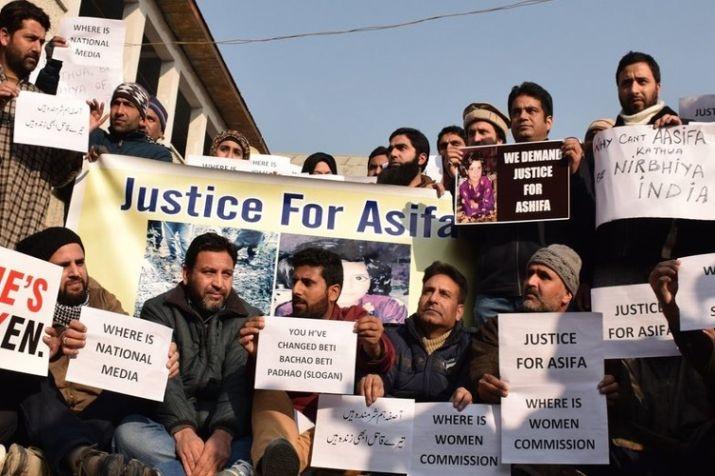Decoding the Mystery Behind the Brutal Rape and Murder of Minor Bakarwal Girl in Kathua

Image Courtesy: India TV
The gruesome rape and murder of a seven and a half years old Bakarwal girl had a chilling message embedded in it, for her community. Bakarwals are a Muslim nomadic tribe, some of whmo have settled in the Hindu-dominated Rasana village in Kathua, Jammu. According to the chargesheet, the motive behind the rape and the murder was to instill fear and dislodge the nomadic tribe from the forest areas of the Jammu province.
Roots of the Hatred for the Bakarwal Community
Historically, the Gujjar-Bakarwals are a pastoral nomadic ethnic group – majorly comprising Sunni Muslims, who follow a migratory pattern of life. They alternate between the high and low altitudes of the hills, as seasons change. They reside in the plains in the winter, and move uphill during the summer.
In Jammu, they are mostly concentrated in the areas such as Rajouri, Poonch, Kathua and Reasi. The community was categorised as scheduled tribe in April 1991.
The community rears goats and sheep traditionally, and oscillates between different altitudes with their herds. They are landless nomads, who physically possess the forest land while migrating to other areas. There is no bona fide legal setup for the tribe to possess land in the forests of Jammu and Kashmir.
Post-partition Custodial Land
The term ‘custodial land’ dates back to the year 1947. After the partition of India in 1947, thousands of Muslims were killed in the riots that ensued. Fearing the communal killings by the Hindu mobs, Muslims migrated to the neighbouring country Pakistan, leaving behind swathes of land, also in the state of Jammu and Kashmir.
Upon deliberation, in 1949, a dedicated department was set up and the land was taken over by the government – which came to be known as the ‘evacuee property’ or ‘custodian property.’
“In Kathua district, almost 90 per cent of the land is custodian property, and it is occupied by the members of the majority community. But something has changed over the past two to three years. Communal boundaries have been drawn on the land of use. Surprisingly, if a cow owned by one community infiltrates into the land owned by another, it is not returned,” said Talib Hussian, an activist and a lawyer, who also belongs to the Gujjar-Bakarwal community.
“The tensions over the land occupation have amplified to an extent that Gujjars have to pay Hindus, even to collect fodder and leaves in the area, despite the land being a custodial property,” Hussain added.
Policies
It is noteworthy that The Forest Right Act, 2006 (FRA), also known as the Scheduled Tribes and other Forest Dwellers Act, 2006 extends to whole India, except for the state of Jammu and Kashmir.
Gujjar and Bakarwals have been protesting for the act to be extended to the state of Jammu and Kashmir, or for an identical legal provision in the state. However, the BJP has always been opposed to this. Since BJP came to power, the extension of FRA, 2006 was linked to the revocation of Article 370, which provides ‘special status’ to the state of Jammu and Kashmir.
The FRA, if extended, would rehabilitate the community legally and constitutionally, in areas belonging to the tribes since centuries. With the absence of the constitutional rights in the place, the landless and shelterless pastrol community has faced a lot of troubles.
“The state has to make its own laws, which are at par with national laws or bring in the same law or reject it also. This has been the normal practice. But, what is normally seen, is that the people-friendly laws are not extended to Jammu and Kashmir. In J&K, the tribals physically possess the land, but not legally. At times, few of them take the land for a few months in winters. This is basically the animal-rearing population. They keep on moving,” said Anuradha Bhasin Jamwal, political analyst and the executive editor of Kashmir Times.
Almost 11 per cent of Jammu and Kashmir population constitutes nomadic community. So far, it is the largest Muslim group. Hence, the Hindutva groups have been trying to instill hatred in the minds of the majority Hindu population by arguing that if a tribal-friendly policy is implemented in the state, it would change in the demography of the Hindu-dominant region – Jammu.
“The problem is the absence of amendments in the J and K forest land (act?) and absence of tribal affairs policy, which has been in the waiting for a long time. On the other hand, the BJP has been opposing these laws. Over the last few years, the Hindu right wing forces, have tried to spread a lot of hate propaganda against the Gujjars. They are trying to create stereotypes that they are the people who are land-grabbers and they are encroaching the land and that they need to be evicted. But these nomads are always on the move. At the same time, nobody is talking about the big land chunks held by private holdings. Also, BJP is trying to revoke article 370, and is saying they cannot extend any law until 370 is revoked,” added Bhasin.
The minor Bakarwal girl’s horrific rape and murder is the part of the larger social engineering to terroise the Bakarwal community to an extent that they are forced to leave the area.
Eviction Drive in Jammu
Over a period of time, the land occupation has created friction between the majority Hindu community and minority Bakarwal community. The majority community is looking at the minority with skepticism, and their fears are fed by the political parties.
Traditionally, the tribe has been systematically evicted but the eviction has amplified with right wing hate propaganda. Post 2014, the forest officials along with the police forces have demolished nearly half a dozen of thatched houses of Gujjar and Bakarwals. There has been no action against the officers by the Forest Minister Choudhary Lal Singh, who is a BJP leader. Choudhary Lal is the same leader, who was also a part of the rally supporting the accused in the Kathua gang rape case.
“Eviction is happening on a larger scale in the last few years. Spreading these kind of stereotypes about the tribal communities has intensified the communal polarisation in Jammu and Kashmir. BJP has been playing out with the statements of CM Mehbooba Mufti to spread hatred and communalise the region further,” Bhasin told Newsclick.
All these activities have instilled fear inside the hearts of Gujjar-Bakarwals, who have neither land, nor protection.
Cases of Harassment
In an attempt to safeguard the rights of the tribals and to ensure that no further harassment cases on the pretext of anti-encroachment are registered, the Chief Minister Mehbooba Mufti directed in Feburary 2018 that tribals will not be evicted without the prior approval from the Tribal Affairs Department. She further stated that till a formal Tribal policy is formulated and issued, tribal population will not be dislocated or disturbed.
Almost a month later, on March 8, 2018, Lal Singh had issued directions to all the District Forest Officers (DFOs) to remove encroachments from the forest land. During the meeting, clear directions were given to complete demarcation and launch an eviction drive against the 'encroachers' (who, according to the BJP and its fringe affiliates, are Gujjar-Bakarwals). The Forest Minister was also quoted as saying, “If encroachment is not removed, no one will be worse than me.”
“This difference in the decisions by the two parties has been a key issue with this government all along. Since Mufti has taken over as the chief minister of the state, there has been division of power. It’s like you rule Kashmir valley and let BJP rule Jammu region. Often, they do not interfere with each other’s domain. For this peculiar case, the chief minister took a very strong stand. The police SP Vaid also took a very strong stand. This was one exceptional case in the last four years, where some stand was taken on the basis of legality, ethics and morality. In other cases, there has been absolute silence and non-interference in each other’s domain,” Bhasin said.
Land Encroachments and Nomads
According to the figures revealed in January 2017, ‘encroachers’ have grabbed 50.94 hectares of land at tourist resorts. In 2015, almost 20 lakh kanals of land was grabbed by powerful land mafia, senior politicians, bureaucrats and police officers in the state of Jammu and Kashmir.
“It is these big land sharks that are being patronised by the BJP and other political parties, because they are influential people. It is not just about the tourism area, but also other areas. Other businessmen are interested in property dealership and so on and so forth. Political parties have always been patronising them. It has been a misplaced notion that the Gujjars and Bakarwals are the main encroachers. This is all a hate propaganda,” Bhasin said.
In India, the forest land encroachment by the big mining companies and conglomerates has been a major reason for conflict in states like Chhattisgarh, Madhya Pradesh and Orrisa. In Madhya Pradesh and Chhattisgarh, huge chunks of forest lands are used for coal and iron ore mining.
Deaths and incidents of violence erupted because of these lands – encroached by private holdings, are countless. The violence and deaths are not acknowledged and registered, when it comes to the conflict between corporates and the tribal population. The forests are always perceived as the state property, and not people’s.
Demand for an Eviction Policy
While spearheading the campaign against the transfer of Kathua rape case to CBI, there were other demands which were put forward by the Bar Association of Kathua. One of them was to rollback the decision to protect the Gujjars and Bakerwals from eviction in Jammu.
“There was one meeting, which was held in mid-February. In the meeting, the personal issues of victimisation and harassment of the tribal community came up. The tribals are mostly landless people and the forest law has not been updated, There is no tribal policy. So, in this context, CM Mehbooba Mufti had said that until there is no tribal policy in place, no man will be evicted without the knowledge of the Tribals Affairs Department. There was a context in which this was said, but it was all blown out of proportion. This clearly reflects their communal ideas and thinking,” said Bhasin.
PM’s Silence and Mufti’s Discomfort
On April 13, 2018, Prime Minister Narendra Modi condemned the horrific rape-murder case after maintaining 3-month-long silence. His deafening silence over the matter has also raised a serious issue for Chief Minister Mehbooba Mufti, whose party is an ally with the BJP, in the state. His silence has also hinted towards his political patronage.
“I am not even surprised that prime minister remained silent for so long. He is not known to speak on issues that make BJP uncomfortable. He talks about ‘Mann Ki Baat’ but never listens to the ‘Man Ki Baat’ of the public. He is known to do that. His silence at a time, when after three months there is mobilisation for justice across the country, shows he is on the march of no protest. BJP has a clear motive to create mobilization now. Who gains from it? It’s BJP. It’s not Jammu which is important for the BJP, but the political nature of Kashmir which will be played out in rest of the country by showing victimisation of Hindus in Jammu. This will be used in future,” Bhasin told Newsclick.
Get the latest reports & analysis with people's perspective on Protests, movements & deep analytical videos, discussions of the current affairs in your Telegram app. Subscribe to NewsClick's Telegram channel & get Real-Time updates on stories, as they get published on our website.























